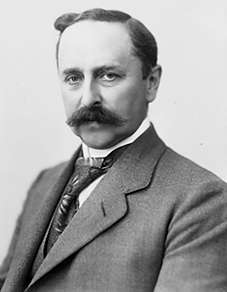Nils Edén facts for kids
Quick facts for kids
Nils Edén
|
|
|---|---|
 |
|
| Prime Minister of Sweden | |
| In office 19 October 1917 – 10 March 1920 |
|
| Monarch | Gustaf V |
| Preceded by | Carl Swartz |
| Succeeded by | Hjalmar Branting |
| Personal details | |
| Born | 25 August 1871 Piteå, Sweden |
| Died | 16 June 1945 (aged 73) Stockholm, Sweden |
| Political party | Liberal Coalition |
| Alma mater | Uppsala University |
Nils Edén (born August 25, 1871 – died June 16, 1945) was an important Swedish historian and a liberal politician. He served as the Prime Minister of Sweden from 1917 to 1920. Nils Edén, along with Hjalmar Branting, played a big role in changing Sweden. They helped Sweden move from being a constitutional monarchy (where the king had a lot of power) to a full parliamentary democracy. This meant that the people, through their elected representatives, had more power. They also helped make sure both men and women could vote equally.
Contents
Early Life and School Days
Nils Edén was born in Piteå, a town in northern Sweden. His father was a school principal. Nils finished high school in Luleå and then started studying at Uppsala University in 1889.
He worked hard and earned his PhD (a very high university degree) in 1899. In the same year, he became a "docent" in history at the university. A docent is like a special lecturer or researcher. He was an expert in Swedish history from the 1500s and 1600s. He also wrote about the old union between Sweden and Norway. His main university paper, which won an award, was about how the government was set up in Sweden during the early Vasa period (1523–1594).
Life and Work in Uppsala
Nils Edén became a history lecturer at Uppsala University in 1899. He became a full professor in 1909. He stayed in this teaching role until 1920.
While teaching, he was also very active in politics as a liberal. In the 1890s, he wrote about the important issue of Sweden's union with Norway. He also spoke to students at Uppsala about the need for compulsory military service. This meant that all young men would have to serve in the military. This idea was connected to the discussion about universal suffrage, which means everyone having the right to vote. Edén strongly supported both these ideas.
Becoming a Member of Parliament
In 1908, Nils Edén was elected to the Second Chamber of the Swedish parliament. The Riksdag is like Sweden's main law-making body. By 1911, he was part of the parliament's committee that dealt with the country's constitution.
When Karl Staaff, another liberal, became prime minister in 1912, Edén became the leader of the liberal group in the Second Chamber. After Staaff passed away in 1915, Edén became the main leader of the liberals. He was part of the more traditional side of the liberal party.
Serving as Prime Minister
In the 1917 election, the Liberals, led by Edén, gained a lot of support. Together, the Liberals and the Social Democrats had a clear majority in the parliament. Even so, King Gustaf V first asked a conservative politician to form a government. However, the conservatives could not get enough support.
This showed that the King could no longer just pick a government he liked. He had to choose leaders who had the support of the Riksdag (parliament). So, King Gustaf V had no choice but to ask Nils Edén to become prime minister. Edén then formed a government with the Social Democrats. Hjalmar Branting, a Social Democrat, became the minister for finance.
The Edén government quickly took over most of the King's powers. Even though the old rules said "the King alone shall govern the realm," it was now understood that the King had to follow the advice of his ministers. And these ministers were now responsible to the Riksdag. This was a huge step in making Sweden a truly parliamentary country, where the elected parliament had the real power. This change was officially written into law much later, in 1974.
The Edén government also finally managed to get parliament to agree to universal suffrage. This meant that all adults, both men and women, would have the right to vote. There was a fear of revolution in Sweden, especially after what happened in Russia and Germany after World War I. This pressure helped push for more democracy. Universal suffrage was officially introduced in 1921.
The Edén government stepped down in 1920 after they had decided that Sweden would join the League of Nations.
Becoming a County Governor
After being prime minister, Nils Edén was appointed Governor of Stockholm County. He held this position until 1938. He also continued to be a member of parliament. He disagreed with some of his party's policies, especially about prohibition (banning alcohol). Because of this, he and about a third of the liberal members left the party and formed a new one in 1923.
See also
 In Spanish: Nils Edén para niños
In Spanish: Nils Edén para niños
 | Bayard Rustin |
 | Jeannette Carter |
 | Jeremiah A. Brown |

